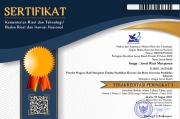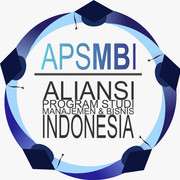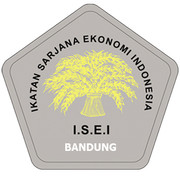Assessing the Impact of Competency and Career Growth on Employee Performance: Innovative Work Behavior as a Mediator in Public Sector
Abstract
This study investigates the impact of competency and career development on employee performance, with innovative work behavior acting as an intervening variable at Bappedalitbang Surabaya. As the primary think tank for the city's development planning, Bappedalitbang requires highly competent human resources to execute its functions effectively. This research aims to analyze the relationships between competency, career development, innovative work behavior, and employee performance. Using a quantitative approach, data were collected through surveys distributed to employees at Bappedalitbang Surabaya. The results indicate that both competency and career development have significant positive effects on innovative work behavior and employee performance. Additionally, innovative work behavior mediates the relationship between competency, career development, and employee performance. These findings provide valuable insights for the Surabaya city government in formulating human resource management policies to enhance employee performance through targeted competency development and career growth initiatives.
Keywords
Full Text:
PDFReferences
Arora, M., & Mittal, A. (2024). Enhancing organizational performance through HR analytics capabilities: mediating influence of innovative capability and moderating role of technological turbulence. The International Journal of Human Resource Management, 35(19), 3271–3304. https://doi.org/10.1080/09585192.2024.2403541
Atatsi, E. A., Edem M., A.-G., & and Mensah, C. (2021). Predicting task performance from psychological ownership and innovative work behaviour: A cross sectional study. Cogent Business & Management, 8(1), 1917483. https://doi.org/10.1080/23311975.2021.1917483
Fosso Wamba, S., & and Guthrie, C. (2020). The impact of blockchain adoption on competitive performance: the mediating role of process and relational innovation. Logistique & Management, 28(1), 88–96. https://doi.org/10.1080/12507970.2019.1679046
Fröhlich, P., Ricarda, R., Timo, K., Elvira, R., & and Diestel, S. (n.d.). Newcomers’ happiness at work trajectories and their relation to servant leadership and innovative performance. European Journal of Work and Organizational Psychology, 1–15. https://doi.org/10.1080/1359432X.2025.2495988
Hoang Dang, L., Bui, N. V., & and Duy Huan, D. (2025). How human resource management practices promote job performance through innovative work behavior: does innovative climate matter? Cogent Psychology, 12(1), 2498245. https://doi.org/10.1080/23311908.2025.2498245
Kolibáčová, G. (2014). The Relationship Between Competency and Performance. Acta Universitatis Agriculturae et Silviculturae Mendelianae Brunensis, 62, 1315–1327. https://doi.org/10.11118/actaun201462061315
León, O., David, de la F., Simon, F.-V., & and Puente, J. (2024). Big data analytics capabilities: direct and mediating relationships with innovative and business performance. Journal of Management Analytics, 11(2), 182–201. https://doi.org/10.1080/23270012.2024.2328522
Mehralian, G., Shiva, S., Christopher, Z., & and Babapour, J. (2023). The dynamic capability view in exploring the relationship between high-performance work systems and innovation performance. The International Journal of Human Resource Management, 34(18), 3555–3584. https://doi.org/10.1080/09585192.2022.2138494
Shafait, Z., & and Huang, J. (2023). Exploring the Nexus of Emotional Intelligence and University Performance: An Investigation Through Perceived Organizational Support and Innovative Work Behavior. Psychology Research and Behavior Management, 16(null), 4295–4313. https://doi.org/10.2147/PRBM.S422194
Shih, H.-A., & and Susanto, E. (2017). Perceived identifiability, shared responsibility and innovative work behavior*. The International Journal of Human Resource Management, 28(22), 3109–3127. https://doi.org/10.1080/09585192.2016.1143860
Vuong, B. N. (2023). The influence of servant leadership on job performance through innovative work behavior: does public service motivation matter? Asia Pacific Journal of Public Administration, 45(3), 295–315. https://doi.org/10.1080/23276665.2022.2070517
Yan, Y., Yipeng, T., Yueru, M., Feng, J., Sisi, L., & and Zhu, X. (n.d.). Push back to move forward: how knowledge counterflow boosts creativity in older employees. The International Journal of Human Resource Management, 1–26. https://doi.org/10.1080/09585192.2025.2500512
Zain, R. D. C., Fendy, S., & and Mitra Uktutias, S. A. (2025). How does ambidextrous leadership influence innovative work behavior and employee performance in public service: a study of immigration offices? Cogent Business & Management, 12(1), 2480241. https://doi.org/10.1080/23311975.2025.2480241
DOI: https://doi.org/10.17509/image.2025.003
Refbacks
- There are currently no refbacks.
Copyright (c) 2025 Ema Agustina, Dewie Tri Wijayati Wardoyo, Andre Dwijanto Witjaksono

This work is licensed under a Creative Commons Attribution-ShareAlike 4.0 International License.
Image : Jurnal Riset Manajemen is licensed under a Creative Commons Attribution-ShareAlike 4.0 International License
View My Stats



